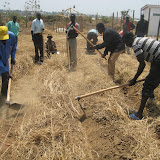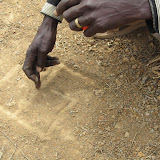Affirmation: Several encouraging conversations: (1) When we describe our intent to facilitate a congregational/village planning process to lead to projects in health, agriculture, income-generating projects, Pastor John Kenyi says "we spoke and you listened; thank you for your sweet words" and Lasu Payam (sub-county district) Director says "You have the best plan" (2) When Diantha describes the regional women's trainings she wants to do with Methodist church women and the traditional birth attendents from their villages, Poppy Spens (UK missionary ) tells us she's been planning the exact same thing with Episcopal church women and suggests we collaborate (3) John Spens (also UK missionary) agrees that if I can come up with some additional funding, the Episcopal church's women's microenterprise program could be expanded to include women from the United Methodist churches as well. (4) We meet with the County heads of Health and Agriculture and they are genuinely happy for our presence and our plans.
Boda: This is the word for motorcycle locally. I've been riding it a lot more than Diantha, but am having trouble with it stalling almost every time I try to start it. When Diantha goes to practice, she has no trouble at all; she shows me how to give it more gas as I let the clutch out. So now that she's taught me how to start it, I'm teaching her how to think ahead about downshifting so she can stop it without stalling out. Boo just borrowed the boda to get familiar with it in case he needs to borrow it one day when we need to use the Land Cruiser.
Culture: A couple fundamentals about Sudanese culture that shape our days: (1) Relationship, relationship, relationship. From something as simple as being sure to say good morning to every acquaintance, to understanding the importance of the handshake as an affirmation that you are focusing on the other person and acknowledging their worth. Even better if you ask about their family, or their crops, or something that shows you are putting your attention on them. I still remember a couple striking instances in which a church member has said that "You came and visited us and promised to come back and to help, and we felt we became somebody." Its hard to imagine how dehumanizing the 22-year war must have been. We who feel frustration with how slow cooperation, trust and maturity can be must keep remembering how deep this dehumanization has been. (2) Wealth is to be shared. A fundamentally different view of wealth and possession. Unlike the assumptions of westerners here like us that we have a right to our possessions, both our stuff and our "space", the conception here is that those who have wealth have a responsibility to share it with those who don't. Also the assumption that its more important for donated resources to be spent on the greatest need that presents itself even when that is not the intent of the donor. I think the African assumptions are far closer to Biblical teaching than our western assumptions, even though we tend to get bent out of shape and grumble when people don't exhibit the western assumptions. (3) Knowledge is highly prized. The book African Friends and Money Matters say the many Africans share resources more readily than knowledge. I haven't observed that yet, but when we visit a church we always hear clearly that they value the knowledge they believe we have to share with them and are excited and hopeful that it will make their life better. It makes me want to get back to the villages quicker than we seem to be able to do, thanks to the rainy season making roads difficult.
Devotions: I've been re-reading Thomas Merton's first journal, Sign of Jonas; p. 82, "If You allow people to praise me, I shall not worry. If You let them blame me, I shall worry even less, but be glad. If You send me work I shall embrace it with joy and it will be rest to me, because it is Your will. And if You send me rest, I will rest in You. Only save me from myself. Save me from my own, private, poisonous urge to change everything, to act without reason, to move for movement's sake, to unsettle everything You have ordained. Let me rest in Your will and be silent. Then the light of Your joy will warm my life. Its fire will burn in my heart and shine for Your glory. This is what I live for."
Education: What a week for learning. I'm learning about fish farming as a real possibility here and the pros and cons of using improved cassava varieties. Diantha is learning about how midwifery is and isn't practiced in the rural health centers run by the government, about community health committees and community health educations supposedly in every "boma" (like a township, a 10 mile x 10 mile area). We're both learning where there are and aren't functioning health clinics, some of them mobile clinics that come in one day a week, and sharing that information with the pastors of the 17 United Methodist churches so they can educate their member about it.
Farming: Gradually five weeks of listening, reading and thinking are taking shape. There are several NGOs (=nonprofits) already doing some excellent agricultural work here. One of them (Christian Reformed World Relief Council) has conducted an excellent baseline survey, and just finished training 833 farmers in the area; I hope to be able to get some of the farmers in "my" villages into their program the next time, which will be the end of the dry season in February before the March/April rainy season begins. Their survey shows that the major barrier to growing enough food for their families, much less for commercial markets, is "labor". What this really means is that using hand tools (hoes, machetes, axes, spades) and traditional cultivation techniques (turning over the soil before planting, minimal irrigation) the typical family is not usually able to cultivate enough land to feed themselves and produce food for sale so they can meet their cash needs for buying other food, medicine, school fees. So the answer of the NGOs, the Government here, and of the new USAID grant to south Sudan is to provide more tractors which will be rented to farmers at a subsidized cost. As a short term strategy, I will probably promote this program with the farmers in the 17 villages I am working with (each of the villages where there is a United Methodist church.) But I have problems with it as a long-term strategy; both on the basis of financial sustainability (how will the impoverished farmers come up with the rental capital in 4-5 years when the program ends?) and environmental sustainability. I have been studying no-till and minimal-till agriculture and I think it could hold the future of sustainable farming for these folks: it retains much more of the fertility of the soil than plowing, or at least of inverting the soil when plowing. And pilot projects elsewhere in Africa show that once the no-till/minimal-till plot is established in one or two years, it decreases labor time by 40% for the same amount of acreage, while producing anywhere from 3-9 times as much yield per acre. To move to these methods will take time and persuasion, so I am thinking about establishing a demonstration garden that allows people to see plots side by side illustrating the different methods and yields, as a hands-on teaching tool. If this works, it might persuade a village to try this on a limited basis. There's a whole system of Limited Input Sustainable Agriculture (LISA) which combines minimum-till, near-organic conservation agriculture with an emphasis on perennials that allow food production during the dry season, animal confinement (almost all animals roam free almost all the time, wreaks havoc on gardens), etc. One mission organization has put this together in a way that I think will work with the predominantly Christian villages in our area of south Sudan; www.farming-gods-way.org/FGW.htm
Saturday, October 2, 2010
Subscribe to:
Post Comments (Atom)
















Beautiful. Absolutely Beautiful.
ReplyDeleteI am always interested in hearing what you and Diantha are doing, but a couple of things you spoke of really stood out for me this time. First, about the dehumanizing effects of war; having been through violent events, I know first-hand how dehumanizing they can be and what that does to your deep-down view of yourself. I love the way this culture values the affirmation of self-worth in deep attention to and respect for individuals and families. I can't think of a better way to say, "yes, you are human, as am I; you are of the same worth as I, and I value you as I value myself." Of course, I haven't been through 22 years of war, but I have suffered deeply traumatic violence, and pain is pain. I am so proud of the way you immediately recognized the need for personalizing your contact with these lovely people! The other thing I really loved reading was the Merton quote; I feel inspired to rest in God's will as doors open for me to do the work He means me to do, whatever that work is.
ReplyDeleteLove to you both!